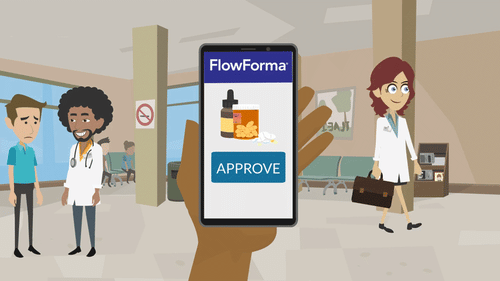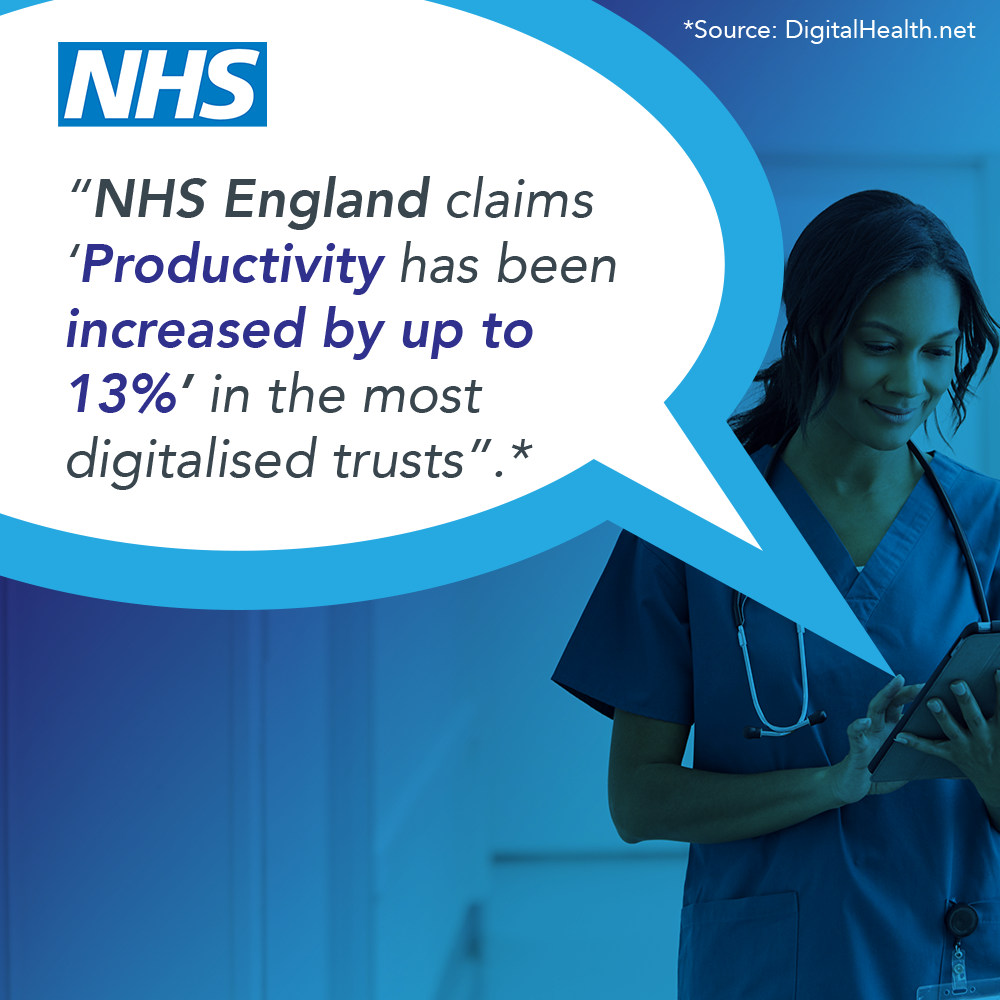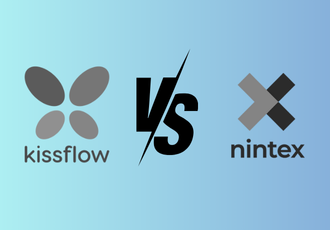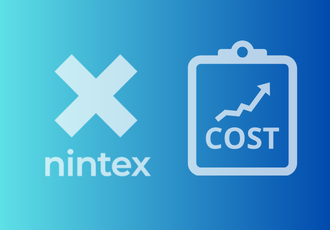As the Greek philosopher Heraclitus said 2,500 years ago, 'Change is the only constant in life'. With a new UK government in the last week, I'm anticipating some change in Healthcare given that one of the big three strategic shifts promised in the Labour Party manifesto was better utilisation of technology and data.
That brings me to another phrase that Heraclitus coined 'everything flows' which is a great segway into a topic close to my heart - workflow automation in Healthcare. Let's hope that with new leadership comes fresh priorities and a focus on automating healthcare workflows and process improvements.
- Productivity is key: Employees want to be as productive as possible, in any busy workplace environment, and eliminate wasted time. Ensure that optimal work practices are at the top of your mind and key when under time and budgetary pressures.
- Remove administrative burden: This is particularly topical in the NHS and other healthcare settings. We are all too aware of the pressures clinicians and administrative staff are under to meet the needs of patients and deliver the best possible patient care and patient satisfaction. However, the administrative element should be comprehensive enough to satisfy the requirement but not at the expense of time spent caring for patients.
- Provide fit-for-purpose intuitive workflows: The COVID-19 pandemic exacerbated the need for a sophisticated operational backbone and emphasised that there was no room for archaic workflows and repetitive tasks/unnecessary duplicate work. Many Healthcare organisations still grapple with old legacy systems while pressured to digitise at scale, there has never been a better time to highlight the benefits of healthcare workflow.
-
The operational opportunity: If you are in an operational role within the healthcare industry this blog highlights the advantages of automated workflow, how healthcare professionals benefit significantly from automation, and helps you to understand the potential benefits across your entire organisation.
What is workflow automation in healthcare?
Workflow automation in healthcare is all about making things easier by using technology to cut out the time spent on paperwork and administrative tasks. Instead of getting bogged down by routine chores, healthcare providers can automate these processes, freeing up more time to focus on what really matters: caring for patients. By automating workflows, healthcare teams can work more efficiently, leading to smoother operations and ultimately, better outcomes for patients. It's like the medicine needed to keep everything running smoothly in the background.
The automation of high-value paper-laden processes can directly benefit patients contributing to positive patient outcomes.
Automating healthcare workflows is the medicine needed to ensure operational efficiency and effectiveness.
10 ways to automate workflow in the healthcare industry
Let's look at 10 healthcare workflow automation examples to illustrate the potential and provide you with some inspiration.
1. Automating IT processes
- The IT department has a lot to gain from automated workflows. There are some obvious quick wins but once an IT department implements one workflow, and realises the benefits to them as a department, they encourage business users to think about the workflows they need to automate and coach them to build their own.
- Empowering business users to create their processes makes more sense (with governance from IT). The fusion is a win-win situation as business users love that they can positively impact an automated process designed and implemented by them and have the assurance of governance from IT. All while reducing the burden on IT developers.
- I'm seeing this more and more. One particular NHS client actively encourages this approach coaching one to two business users on the FlowForma Process Automation platform each month. By promoting them to super-user status, the Trust is rapidly scaling the number of processes digitised.
IT workflows ripe for automation:
-
IT ticketing system
-
Provisioning access
-
Change requests
-
Disabling access
2. Automating HR processes
We are all familiar with the volume of emails, paperwork, and validation processes involved when you start a new post in any organisation. It takes time and while your new employer wants you to start as soon as possible and fill that gap some mandatory HR steps need to be ticked off before you can begin.
- Making life easier for managers, joiners & leavers: When a hospital automates HR processes, life is much easier for all concerned. The hiring manager may want an automated workflow to get approval to hire, the HR manager may need an automated process to advertise the vacancy. Similarly, a streamlined workflow to process applications will ensure the consistency and file sharing required to evaluate potential candidates and distribute that information to an interview panel.
-
Other HR workflow automation examples: The HR department has so many use cases. Below are other workflows in healthcare HR settings that our healthcare providers are implementing to improve efficiency and reduce the chances of human errors.
-
-
HR Training request
-
Annual leave request
-
Joining and leaving processes
-
Change of on-call person process
-
Hospital staff transfers
-
Policy readership
-
Flexible working application
-
Authorisation forms for medical and dental locums
-
3. Automating finance processes
- Procurement workflow automation: Procurement processes are notoriously manual. Small Trusts may not need sophisticated workflows due to the number of employees and may manage their procurement processes in-house. On the other hand, one of our larger NHS clients is responsible for procurement across 9 different trusts that, in total, employ 60,000+ healthcare professionals. That's a lot of purchase requests. So consistency and workflow automation is desirable.
- The Procurement Act: There is new procurement legislation due to be implemented in October 2024 which is putting added pressure on healthcare providers to 'get their house in order'. The Procurement Act is an important piece of legislation that will change the way the public sector buys goods and services, bringing a range of benefits, including simplicity, flexibility, consistency and transparency. Another reason to consider workflow automation in healthcare.
-
Invoice processing: Invoice processing is a healthcare workflow that hugely benefits from automation. You can imagine how many invoices individual healthcare providers receive. Workflow automation in this use case provides the much-needed consistent approach to ensure invoices are processed and paid on time to avoid future supply issues.
-
Other finance-related healthcare workflow examples include funding applications.
4. Automating health & safety
- Hospital automates fire safety checks: An Irish Healthcare client needed an automated workflow solution for fire safety checks. Patient safety is top of mind in the healthcare industry and the FlowForma workflow automation solution offers them the assurances required to satisfy legislative requirements.
- The hospital needed to conduct 30 fire safety checks every week: This involved printing and distributing the checklists to those tasked with conducting the check, completion and review. It was time-consuming and very manual. Check sheets were often misplaced and human error was regularly an issue with some fields not being completed.
-
A workflow automation process was introduced to address this challenge:
-
-
Weekly workflow triggers are now automatically sent to the fire wardens.
-
They are prompted to complete all mandatory fields on a mobile device and upload any necessary images.
-
If there are no non-conformities the file is automatically stored on SharePoint
-
If non-conformities are identified, the Fire Management lead is notified.
-
-
The entire process has been optimised and resulted in significant time savings, the removal of paper, scheduled weekly tasks, enhanced patient safety and real-time data and reporting.
5. Automating appointments administration
Think of your family, how many upcoming appointment letters you collectively have received and how much wasted paper and postage costs the health service.
- Bring patient communication online: Another FlowForma healthcare client wanted to bring all letters (appointment, patient admission information, medical errors, patient safety or discharge processes, treatment options) online. They aimed to reduce the amount of paper they used from a cost and environmental perspective.
- Unlocking cost savings and helping the environment: The financial, administrative, and environmental savings were astounding. By automating the patient communication process, and bringing letters online the Dublin hospital saved 905,000+ sheets of paper/year and €279,000. Patient satisfaction levels also increased with the patient admission and discharge process being communicated at appropriate timings.

Learn how fast and easy it can be to build healthcare workflows with FlowForma Copilot. In this interactive demo, you'll see FlowForma Copilot build a patient onboarding workflow in minutes.
6. Automation for operational processes
- Estate services in healthcare organizations can also reap the benefits of automated workflows. We get many inquiries on different processes that operations leads would like to automate and a solution that improves patient safety.
- Warehouse safety and building maintenance records are two common examples of traditionally paper-based exercises that should be automated.
- Both examples are potentially a health and safety risk for healthcare organization employees and patients so it is imperative that instances/requests are accurately recorded and there are necessary guardrails in place to notify staff immediately when there are any concerns with urgent cases being routed to the correct decision maker instantly.
- At Blackpool Teaching Hospitals NHS Trust they have introduced 30+ automated operational processes that include:
-
-
equipment allocation process
-
check-in/out process
-
faults record
-
audits
-
These automated processes have resulted in significant reductions in processing time and pass-backs with measurable performance improvements along with improved Analytics from the data captured during the process.
Read more about the Blackpool Teaching Hospitals NHS Trust case study here.
7. Automating theatre notes
Theatre notes are a vital part of hospitals and healthcare as they provide data and insights on patient care. Theatre notes recorded on paper can cause significant challenges for healthcare staff including:
- Lost theatre notes
- Slow process to move data between departments
- Corrupted data
- Inefficient processes that can impact productivity of a hospital or healthcare organisation
But automating theatre note workflows can be transformative for hospitals who can benefit from:
- Improved productivity
- Better patient care
- Access to real-time theatre note information
- Fast sharing of data between departments
- Save hospital and healthcare organisations time and money
8. Hospital to hospital transfer
Patients are often transferred between hospitals if they need to receive specialist care. The process is critical to the welfare of the patient.
Having a seamless workflow to record, track, and monitor transfer is vital to provide patient care. A workflow automation platform can support organizations to automate the end-to-end process. The automation of the hospital-to-hospital transfer process can result in:
- No delays in moving patient
- Better hospital-to-hospital data sharing
- Improved care for patient
9. Automating shift management
Hospital and healthcare rotas manage the schedules of workers. Shift management is an important task in ensuring workers cover patient care 24/7.
Automating shift management supports organizations to manage their work schedule and avoid any errors in staff schedules.
Key benefits include:
- Streamlining shift management
- Avoiding resourcing issues
- Full visibility on employee shifts
- Predicate when employee cover is needed
- Support the HR department in optimising performance
10. Automating patient feedback
Patient feedback is important for the continued improvement of hospitals and healthcare organisations. But, without a structured process in place, feedback is not consistent or available to the relevant decision-makers.
Introducing workflow automation to patient feedback can be transformative for hospitals and healthcare. Benefits include:
- Real-time feedback from patients
- Healthcare leaders can make informed decisions
- Better patient care based on feedback
- Improve reputation of hospital and healthcare organisations
Advantages of workflow automation in healthcare
- Saving paper and money: Imagine saving 900,000+ sheets of paper on one significant process or saving £80,000 on one particular workflow. When you these stats across hundreds of different processes in just one hospital the positive outcomes achieved by employees, patients and NHS purse strings are staggering.

- Move paper checklists to digitised forms: Workflow automation in healthcare alleviates the administrative burden that healthcare professionals are privy to in many day-to-day scenarios. A hospital estate department may need workflow automation to improve the recording and escalation of building improvements. A finance department may need workflow automation in their tender process to ensure consistency and eliminate paper trails.
- Allow workflow tasks to run in parallel: Similarly, an HR department may need to streamline certain HR processes through workflow automation so that the correct tasks are being executed at the right time and in parallel in some instances to onboard and offboard employees.
.png?width=243&height=223&name=FlowForma%20DPA%204-in-1%20Graphic%20(2).png)
- Complement Robotic Process Automation (RPA) with Digital Process Automation (DPA): A trust may already use an RPA tool to mimic some human tasks but the missing piece of the puzzle is a DPA platform that manages the end-to-end process rather than the individual tasks which can be advantageous.
- Filling the skills gap: I have an appreciation of how stretched IT departments are within some of our client hospital sites and attracting and retaining the right skills is also a challenge. The advantages of healthcare workflows to an IT department are significant. I'll delve into these in more detail below.
Learn more about the advantages of healthcare workflow automation in this discussion with Blackpool Teaching Hospital NHS, one of FlowForma's healthcare customers. In the discussion, Laurent Kelly describes Blackpool Teaching Hospital NHS's journey to achieving seamless workflow automation, delivering better patient experiences with digitalisation, and driving operational excellence.
To Sum Things Up...
It is clear that when you automate healthcare workflows the positive outcomes are tenfold. Our healthcare clients are implementing automation across all departments and the appetite from their business and IT professionals to digitise at scale is a testament to the success they are encountering.
We encourage our clients to focus on critical tasks that will make a significant impact and clearly illustrate exactly what automation in healthcare can achieve. Cost and time savings are big wins but enhanced communication, patient safety, and patient experience will positively impact patient outcomes.
Healthcare providers must consider automation to improve patient care and customer satisfaction (internal and external). Efficiency, accuracy, and good timely decision-making should undoubtedly be on any prescription for workflow automation in healthcare.
Healthcare providers owe it to their employees to eliminate repetitive tasks as much as possible to avoid administrative and physician burnout on time-consuming mandatory processes by evaluating and introducing fit-for-purpose automation software.
I would love to connect you to one of our healthcare process automation experts who will help you identify what processes you could prioritise and how best to get the buy-in you need to implement automation.
.jpg) By
By 








